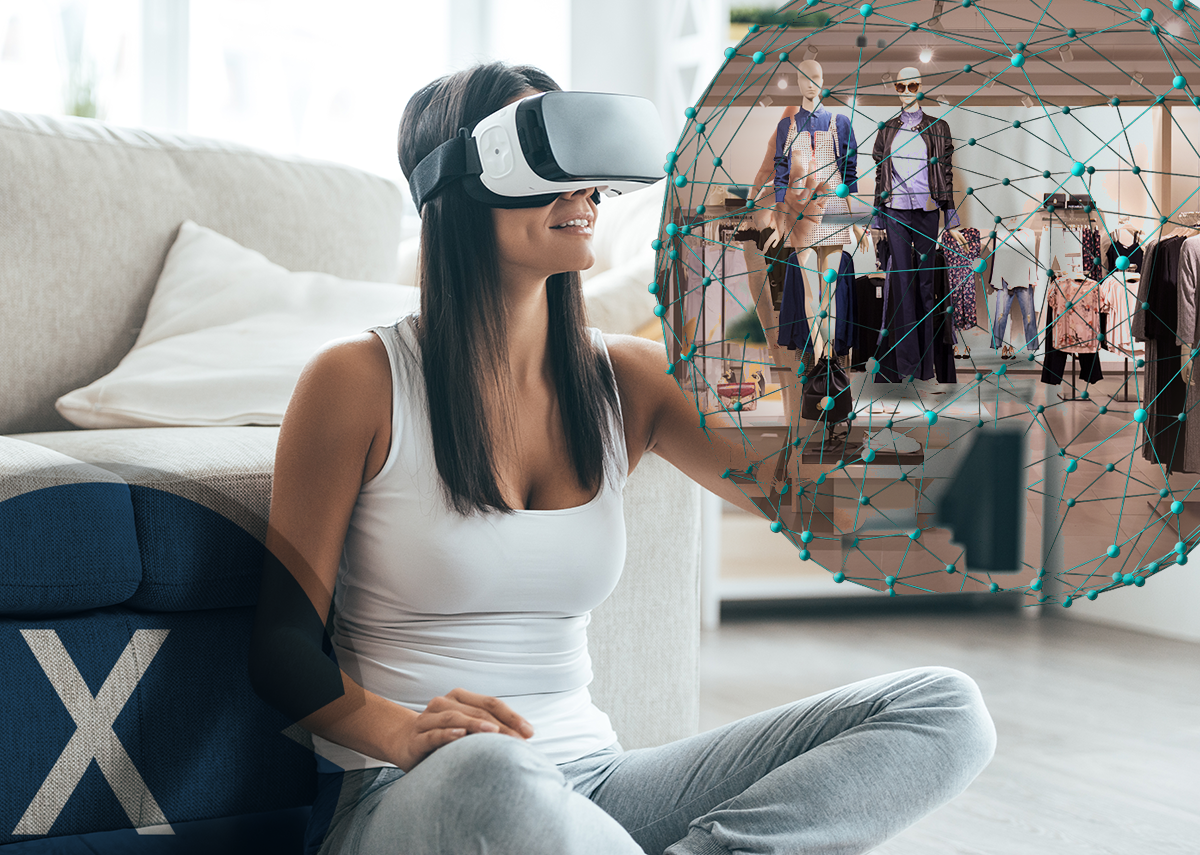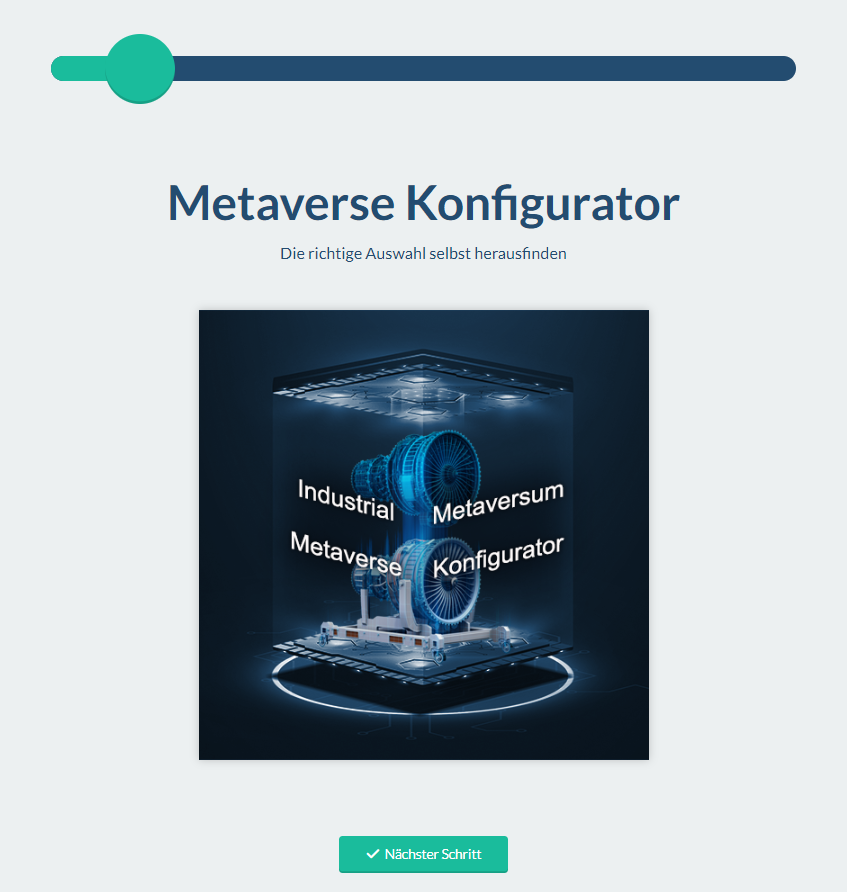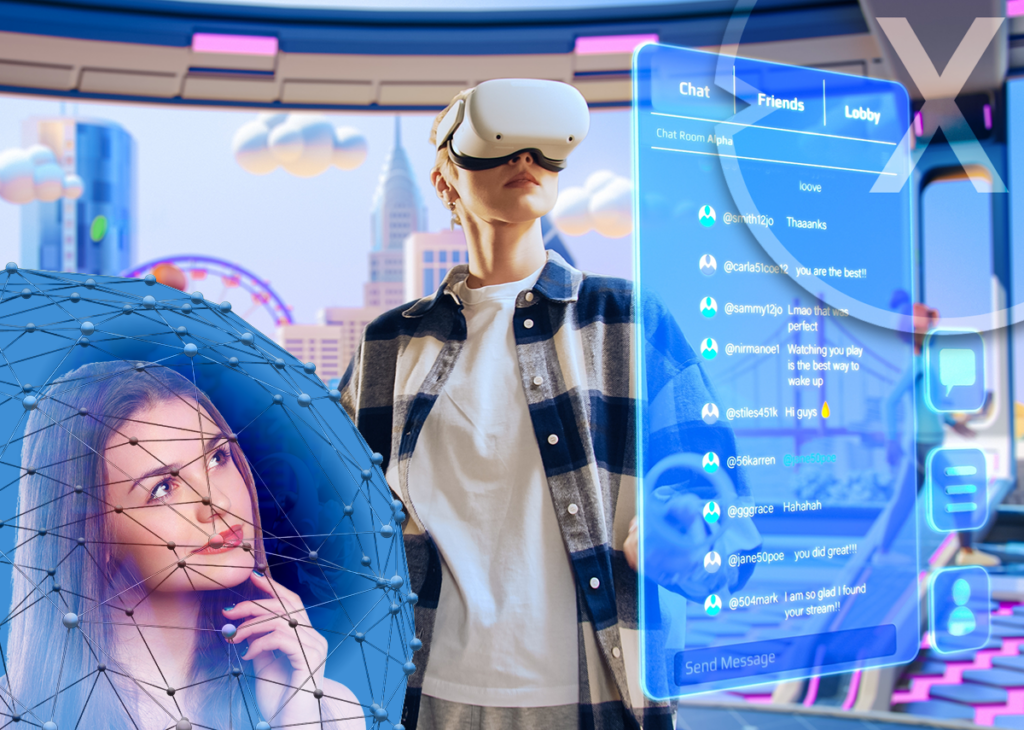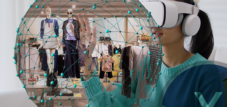The Customer Metaverse and the Experience – Metaverse Commerce & Sales: Customer Experiences and Consumer Experiences
Language selection 📢
Published on: August 1, 2023 / update from: August 1, 2023 - Author: Konrad Wolfenstein
Customer Experiences and Consumer Experiences with the Customer Metaverse
In recent years, the business world has changed dramatically, and a crucial factor that makes companies successful is the customer metaverse. This concept refers to the totality of all digital touchpoints that a customer has with a company, be it on websites, social media, mobile apps or virtual platforms. The goal is to create seamless and immersive customer experiences that foster long-term relationships and strengthen brand loyalty. Let's take a closer look at the key aspects of this fascinating trend:
1. The merging of the digital and physical worlds
In the customer metaverse, the digital and physical worlds merge. Customers today expect a seamless experience between online and offline channels. Companies are using augmented reality (AR) and virtual reality (VR) to create an immersive shopping experience that allows customers to virtually try out products before purchasing them. Likewise, they integrate Internet of Things (IoT) technologies to provide customers with personalized offers and recommendations based on their behavior and preferences.
2. AI and personalized interactions
Artificial intelligence (AI) plays a crucial role in the customer metaverse. Companies use advanced algorithms to analyze customer behavior and enable personalized interactions. Chatbots are a good example of this. They offer fast and efficient customer service 24/7 and can simulate real conversations due to their AI support. Through machine learning, these chatbots are becoming better at understanding and solving customer concerns.
3. The power of social media
Social media has become an integral part of the customer metaverse. Customers share their experiences, evaluate products and services, and their opinions have a significant influence on other consumers' purchasing decisions. Companies rely on influencer marketing to increase their brand awareness and reach target groups. Customer service via social media is also becoming increasingly important as customers often expect quicker and more public responses.
4. Omnichannel strategies
To ensure a consistent customer experience, companies are increasingly relying on omnichannel strategies. Customers can seamlessly switch between different channels without affecting their experience. For example, customers could research a product online, then purchase it in a physical store and later provide feedback via a mobile app. A strong omnichannel presence promotes customer loyalty and increases satisfaction.
5. Privacy and Trust
As the use of technology in the customer metaverse increases, so does the importance of data protection. Customers share a lot of personal information to receive personalized experiences, and companies need to ensure that this data is protected and kept confidential. Privacy policies and transparency in data collection are therefore crucial to gaining and maintaining customer trust.
6. New possibilities for customer experiences
The Customer Metaverse is revolutionizing the way companies interact with their customers. It offers exciting opportunities to create impressive customer experiences while building long-term customer loyalty. The combination of technology, AI, social media and omnichannel strategies enables companies to position themselves successfully in the digital age. But at the same time, privacy and trust are key factors that need to be taken into account to fully reap the benefits of this trend. By understanding their customers' needs and expectations and offering them unique experiences, companies can differentiate themselves from the competition and build strong brand loyalty.
Our Industrial Metaverse configurator
Just try out our universally applicable (B2B/Business/Industrial) Metaverse configurator for all CAD / 3D demo options:
Xpert (B2B/Business/Industrial) Metaverse configurator for all CAD / 3D data can be used on all devices, one platform!
Suitable for:
The Metaverse Revolution: Customer loyalty and brand strategies in the digital age
In this section, we take a comprehensive look at the concept of metaverse and how it significantly influences customer experience and brand strategies. The Metaverse is an immersive online environment where people can interact, buy and sell using technologies such as blockchain, VR, AR, IoT, 5G, AI and gaming. We will highlight the importance of a well-thought-out metaverse strategy and flexible technologies for creating virtual spaces, emphasizing the importance of customer experience and trust.
The Metaverse Revolution
The Metaverse goes beyond simple technological hype – it represents a real revolution in the digital age. It enables a seamless fusion of the physical and virtual worlds, influencing many aspects of our lives. Companies are increasingly recognizing the potential and using it to strengthen their customer loyalty and future-proof their brand strategies.
Metaverse and customer experiences
In the Metaverse, the focus is on interacting with customers in virtual environments. Companies can create unique customer experiences that go far beyond what is possible in the physical world. By using virtual reality (VR) and augmented reality (AR), products and services can be presented in completely new ways. Customers have the opportunity to try out products in virtual environments before purchasing or participate in realistic simulations that address their needs and interests.
Trust in the Metaverse
The introduction of the Metaverse also raises questions about security and customer trust in virtual environments. Blockchain plays a crucial role here as this revolutionary technology enables transparent and secure transactions. Companies that rely on blockchain can gain the trust of their customers and build long-term customer loyalty.
Flexibility and technology in the metaverse
The technologies that enable the Metaverse are constantly evolving. Therefore, flexibility is crucial. Companies must be ready to adapt to the latest technological developments and adapt their metaverse strategy accordingly. For example, the introduction of 5G enables faster and more reliable connectivity, while AI helps create personalized customer experiences.
The Role of Gamification in the Metaverse
Another important aspect of the Metaverse is the integration of gamification. Playful elements can improve the customer experience and motivate customers to actively engage with the brand. By creating fun challenges and rewards, companies can strengthen customer loyalty and build long-term loyalty.
Improve customer experiences
The Metaverse undoubtedly offers an exciting new space for companies to improve their customer experiences and optimize their brand strategies. By integrating technologies such as Blockchain, VR, AR, IoT, 5G and AI, companies can create unique virtual spaces that take customer experiences to a whole new level. Customer loyalty and trust are crucial to ensure long-term success.
Step into the metaverse now and shape the future of customer experience! If you have any questions or need support in implementing your Metaverse strategy, we are happy to help.
The Customer and Consumer Metaverse: Focus on customer loyalty and personal experiences
The Customer and Consumer Metaverse are terms used in the context of XR (Extended Reality) technologies to describe the future of digital interaction and virtual experience. The Metaverse is essentially an augmented virtual space that includes both physical and virtual elements, allowing users to operate in an immersive and interactive environment.
The Customer Metaverse refers to the way companies and brands use the Metaverse to interact with their customers and provide them with personalized experiences. It is a type of digital ecosystem in which companies create virtual spaces to showcase their products, services and brand messages. For example, customers can enter virtual stores, try out products, make customizations, and have interactions with other customers or brands.
The consumer metaverse, on the other hand, refers to the experiences and interactions of individual users within the metaverse. It is the space where consumers can create their virtual identities, interact with other users, engage in virtual activities, play games, create and consume digital content, and participate in virtual events and functions. The Consumer Metaverse offers users the opportunity to live out their fantasies, explore new worlds and build social connections in virtual reality.
The differences in the approach between the customer and the consumer metaverse lie mainly in the goals and intentions. The Customer Metaverse focuses on providing customers with personalized and tailored experiences to strengthen brand loyalty and drive sales of products and services. Companies are using XR technologies to create immersive shopping experiences where customers can try, customize and purchase products virtually.
In contrast, the consumer metaverse focuses on users' individual needs and preferences. It's about offering them unique and entertaining experiences that go beyond everyday life. Users can immerse themselves in virtual worlds, experience adventures, create digital works of art and interact with other users. The Consumer Metaverse allows people to immerse themselves in the digital world and explore their own fantasies and interests.
Despite these differences, there are also similarities between the Customer and Consumer Metaverse. Both concepts use XR technologies such as virtual reality (VR), augmented reality (AR) and mixed reality (MR) to enable immersive and interactive experiences. Both the Customer and Consumer Metaverse aim to push the boundaries of digital interaction and provide users with new possibilities.
In addition, social interactions play an important role in both the customer and consumer metaverse. Companies can interact with customers in virtual spaces and receive feedback to improve their products and services. In the Consumer Metaverse, users can connect with other users, make friends, and build virtual communities.
Opportunities for companies
The Customer and Consumer Metaverse are exciting developments in the digital world. They offer companies the opportunity to develop innovative business models and strengthen customer loyalty. At the same time, they open up completely new ways of digital experience and self-development for consumers. With the rise of XR technologies, we can expect an increasing fusion of physical and virtual reality in the future, which has the potential to revolutionize our understanding of communication, entertainment, e-commerce and social interactions.
The Customer Metaverse: A Revolution in Consumer Experience
The Metaverse is an exciting new opportunity to revolutionize the consumer experience. Through interactivity, personalization and adventure, we can create a unique experience for our customers and put them at the center of everything we do. In this article, we will explore how the metaverse enables the connection between the physical and virtual worlds, discovers new products, enables the use of AI-powered bots, and has a profound impact on the way we as a company interact with our customers .
The power of interactivity and personalization
A central aspect of the metaverse is interactivity. It allows us to interact with our customers in a completely new way. Imagine if our customers could explore our products in a virtual environment, view them from different angles and even interact with them as if they were physically there. This immersive experience allows us to gain a deeper understanding of our customers' needs and preferences and provide tailored solutions.
The fusion of physical and virtual
The metaverse gives us the opportunity to blur the boundaries between physical and virtual experiences. Let's take the retail sector for example. By expanding our physical stores into the virtual world, we can offer our customers a seamless shopping experience, regardless of where they are. You can explore, try on and purchase our products from home as if you were in one of our local stores. This not only creates convenience for our customers, but also allows us to enter new markets and maximize our business potential.
AI-powered bots for personal connection
The Metaverse also gives us the opportunity to use AI-powered bots to create a personal connection with our customers. These intelligent bots can meet our customers' needs and wants by providing them with tailored recommendations, answering questions and solving problems. By leveraging this technology, we can create a 24/7 customer service platform that strengthens our customers' trust and increases their satisfaction.
The importance of “the drop” in consumer advertising
“The Drop” plays a crucial role in consumer advertising in the metaverse. The airdrop process can distribute virtual collectibles as a reward for the loyalty of our customers. These virtual collectors have a high emotional value and create a special bond between our company and our customers. Through skillful marketing strategies around “The Drop” we can attract the attention of our target group and strengthen brand loyalty.
Games and competitions to build customer loyalty
Another important aspect of the Metaverse is the integration of games and competitions to retain our customers. We can create virtual games and competitions that are not only entertaining but also encourage customer loyalty. By offering attractive rewards and prizes, we motivate our customers to actively participate in our virtual events and identify even more strongly with our brand.
Insights from merging metaverse and physical environment
The fusion of metaverse and physical environment allows us to gain valuable insights into our customers' behavior and preferences. By analyzing our customers' interactions in the virtual world and in our physical stores, we can understand exactly what they really want. We can use these insights to further improve our products and services, optimize our marketing and strengthen our customer loyalty.
The Metaverse as a driver for industry-wide changes
The metaverse has the potential to transform entire industries. From entertainment to education, healthcare to retail, the possibilities are endless. As a company, we need to be proactive and take advantage of the opportunities the metaverse offers us. By developing innovative approaches and using the latest technologies, we can position ourselves as pioneers in our industry and gain a sustainable competitive advantage.
Game changer customer metaverse
The metaverse is undoubtedly a game change for consumer experience. Through interactivity, personalization and adventure, we can create unique and unforgettable experiences for our customers. The fusion of physical and virtual world gives us new opportunities to achieve our customers and to interact more closely with them. With the help of AI-based bots, we can establish a personal connection and offer our customers first-class customer service. “The Drop” and virtual competitions enable us to attract our customers' attention and strengthen their loyalty. We can gain valuable insights by analyzing the behavior of our customers in the virtual world and in our physical business. As a company, we should see metavers as an opportunity to revolutionize our industry and actively shape the future. By developing the potential of meta -severse and innovative strategies, we can secure our place at the head of our industry and achieve sustainable growth.
Suitable for:
The Customer Metaverse: The Future of Virtual Reality (VR) and Web 3.0
In the digital world, we are on the threshold of an exciting new chapter: the Metaverse. This ever-evolving virtual parallel universe is made accessible through personal avatars and is becoming increasingly important as the next level of the Internet (Web 3.0). It offers immersive experiences such as social interaction, shopping and learning. Meta (formerly Facebook) in particular is at the forefront, striving to unify all brands and services into one seamless virtual platform. Although the technology is not yet fully developed, Meta's vision is to create a connected virtual realm. To be successful, companies must adapt to this virtual landscape by prioritizing user-friendly interfaces and personalized customer interactions. The metaverse also holds potential for remote work and skills development. Although the Metaverse is still in its early stages, companies such as Walmart, Nike, Ralph Lauren and Kaufland have already shown interest in Metaverse commerce, reflecting a growing market trend.
The importance of Web 3.0
Web 3.0 represents the next evolutionary stage of the Internet, embodied by the Metaverse. Compared to Web 1.0, which mainly consisted of static web pages, and Web 2.0, which introduced social networks and user interactions, Web 3.0 is characterized by an immersive experience and seamless integration of virtual content. The Metaverse is at the heart of Web 3.0, providing users with a rich and engaging digital environment.
Meta: The driving force behind the Metaverse
Meta is one of the leading companies driving the development of the Metaverse. With a clear vision, Meta strives to create an open platform where developers, businesses and users alike can design their own content and experiences. Meta's Metaverse is intended to cover a diverse range of applications, from social interactions and entertainment to education, e-commerce and much more.
The metaverse and its impact on companies
The Metaverse offers companies countless opportunities to present themselves and connect with their customers. Creating a strong presence in the metaverse can lead to improved brand awareness and customer loyalty. However, it is important that companies adapt their strategies to the unique needs of the metaverse.
User-friendly interfaces and personalized interactions
In the metaverse, user experience is key. Companies need to ensure that their virtual interfaces are designed to be intuitive and user-friendly to enable users to navigate and interact smoothly. Additionally, personalized interactions can increase customer engagement by providing customized experiences.
Metaverse Commerce: Opportunities and Challenges
The emerging trend of metaverse commerce opens up the opportunity for companies to offer their products and services in a digital environment. Major brands such as Walmart, Nike, Ralph Lauren and Kaufland have already started expanding their presence in the metaverse. However, they must also consider the challenges that come with integrating e-commerce into the metaverse, such as the security of payment transactions and protecting customer privacy.
The Metaverse Economy and its Future: Potential and Opportunities for E-Commerce
Today's world is dealing with the emerging concept of the Metaverse - a virtual reality shaped by technologies such as Augmented Reality (AR), Virtual Reality (VR), Blockchain and Artificial Intelligence (AI). These developments have the potential to fundamentally change e-commerce. Non-Fungible Tokens (NFTs) are already widely used in the Metaverse economy, and companies are offering virtual experiences. Fashion and luxury brands have a particularly strong presence in this virtual world, while industry giants like Amazon and Salesforce are shaping the future of e-commerce in the metaverse. The continued adoption of blockchain will transform payment methods in the metaverse, while the gaming industry plays a key role in its development. The Metaverse economy promises to take e-commerce to a new level and offer diverse application scenarios to interact with target groups. In this section we look at the current developments and challenges in e-commerce in the metaverse.
Virtual reality and the new dimension of e-commerce
Combining virtual reality and e-commerce opens up fascinating opportunities for consumers and businesses alike. In the Metaverse world, consumers can enjoy an immersive and engaging shopping experience that rivals physical shopping. Virtual showrooms allow customers to view, try on and test products in a simulated environment before making a purchasing decision. Integrating AR technology into the shopping process opens up the opportunity for brands to integrate their products into consumers' everyday lives, resulting in an emotional and personalized shopping experience.
NFTs and the transformation of ownership
NFTs have revolutionized the way we look at owning digital assets. In the Metaverse economy, unique and distinctive virtual items can be bought and sold as NFTs. These virtual possessions can be presented and traded in virtual worlds, creating a new dimension of ownership. This opens up the opportunity for brands to offer exclusive digital collectibles that have high value for their target audience.
Blockchain and the secure future of metaverse e-commerce
Blockchain technology plays a crucial role in the Metaverse economy, especially in the area of payment methods and security. By using blockchain, transactions can be processed securely and transparently, increasing consumer trust. Smart contracts enable automated and reliable payments and deliver a seamless experience for e-commerce transactions in the metaverse.
Gaming as a driver of metaverse development
Gaming has taken a pioneering role in the development of the metaverse. The gaming industry has pioneered innovative technologies such as VR and AR, creating virtual worlds that captivate millions of gamers around the world. Integrating e-commerce into gaming environments allows companies to offer virtual goods and services that enrich and monetize the gaming experience.
The promising future of the metaverse and e-commerce
The metaverse is still in its early stages of development, and there are countless possibilities for the future. E-commerce in the metaverse is expected to continue to grow and spawn new business models. Virtual influencers could become key opinion leaders for brands, while AI-based personalization streamlines the shopping process. Companies should engage with the metaverse early and develop innovative strategies to capitalize on the opportunities presented by this exciting new ecosystem.
Metaverse economy potential for e-commerce
The Metaverse economy has the potential to revolutionize e-commerce as we know it. Technologies such as AR, VR, blockchain and AI are used to create immersive and personalized shopping experiences that increase consumer engagement. NFTs enable the virtualization of ownership and open up new opportunities for brands to offer exclusive digital goods. Gaming plays a central role in the development of the metaverse and offers companies the chance to interact with their target group in virtual environments. The future of the metaverse still holds many exciting developments, and companies should take advantage of these opportunities to expand their e-commerce strategies and strengthen their presence in this emerging ecosystem.
Opinion & criticism of “Metaworse”: The Metaverse is crap – and risky, pointless & dangerous for companies | Mechanical engineering & industry sector
New territory for newbies: What you should know now about blockchain, tokens, NFTs, wallets, cryptocurrency and the metaverse
In today's digital world, terms such as blockchain, NFTs, wallets, cryptocurrencies and the metaverse have become increasingly present. For newcomers, these terms may seem confusing and complex at first. Here we try to explain these terms in an understandable way and give you important and interesting details about them.
More about it here:
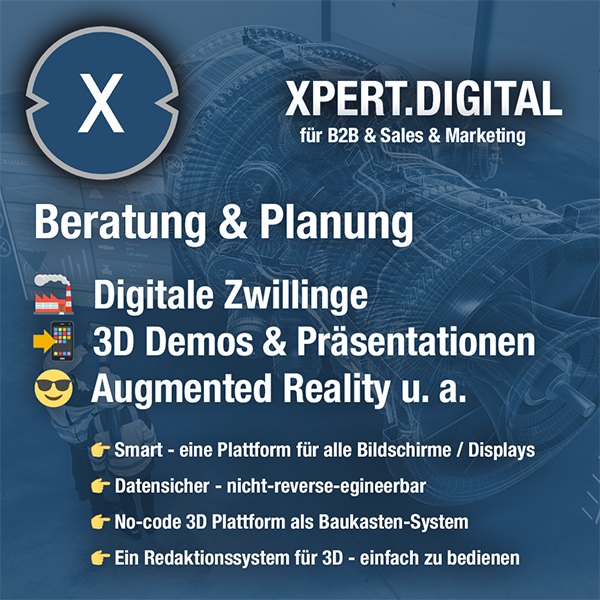
Xpert.Digital – Pioneer Business Development
I would be happy to serve as your personal advisor.
You can contact me by filling out the contact form below or simply call me on +49 89 89 674 804 (Munich) .
I'm looking forward to our joint project.
Xpert.Digital – Konrad Wolfenstein
Xpert.Digital is a hub for industry with a focus on digitalization, mechanical engineering, logistics/intralogistics and photovoltaics.
With our 360° business development solution, we support well-known companies from new business to after sales.
Market intelligence, smarketing, marketing automation, content development, PR, mail campaigns, personalized social media and lead nurturing are part of our digital tools.
You can find out more at: www.xpert.digital – www.xpert.solar – www.xpert.plus



